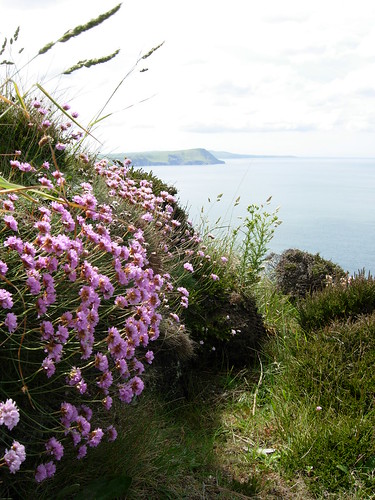
Following on from a comment by Anji, I dug out this excerpt from Flann O'Brien's The Third Policeman, about being on the right road. Because it's the sort of thing that is cheerful making.
The dawn was contagious, spreading rapidly about the heavens. Birds were stirring and the great kingly trees were being pleasingly interfered with by the first breezes. My heart was happy and full of zest for high adventure. As I walked down the road I was pleased enough with everything.
The road was narrow, white, old, hard and scarred with shadow. It ran away westwards in the mist of the early morning, running cunningly through the little hills and going to some trouble to visit tiny tOwns which were not, strictly speaking, on its way. It was possibly one of the oldest roads in the world. I found it hard to think of a time when there was no road there because the trees and the tall hills and the fine views of bogland had been arranged by wise hands for the pleasing picture they made when looked at from the road. Without a road to have them looked at from they would have a somewhat aimless if not a futile aspect.
De Selby has some interesting things to say on the subject of roads.Roads he regards as the most ancient of human monuments, surpassing by many tens of centuries the oldest thing of stone that man has reared to mark his passing. The tread of time, he says, levelling all else, has beaten only to a more enduring hardness the pathways that have been made throughout the world. He mentions in passing a trick the Celts had in ancient times - that of 'throwing a calculation' upon a road. In those days wise men could tell to a nicety the dimension of a host which had passed by in the night by looking at their tracks with a certain eye and judging them by their perfection and imperfection, the way each footfall was interfered with by each that came after. In this way they could tell the number of men who had passed, whether they were with horse or heavy with shields and iron weapons, and how many chariots; thus they could say the number of men who should be sent after them to kill them. Elsewhere de Selby makes the point that a good road will have character and a certain air of destiny, an indefinable intimation that it is going somewhere, be it east or west, and not coming back from there. If you go with such a road, he thinks, it will give you pleasant travelling, fine sights at every corner and a gentle ease of peregrination that will persuade you that you are walking forever on falling ground. But if you go east on a road that is on its way west, you will marvel at the unfailing bleakness of every prospect and the great number of sore-footed inclines that confront you to make you tired. If a friendly road should lead you into a complicated city with nets of crooked streets and five hundred other roads leaving it for unknown destinations, your own road will always be discernible for its own self and will lead you safely out of the tangled town.


I enjoyed that walk!
ReplyDelete